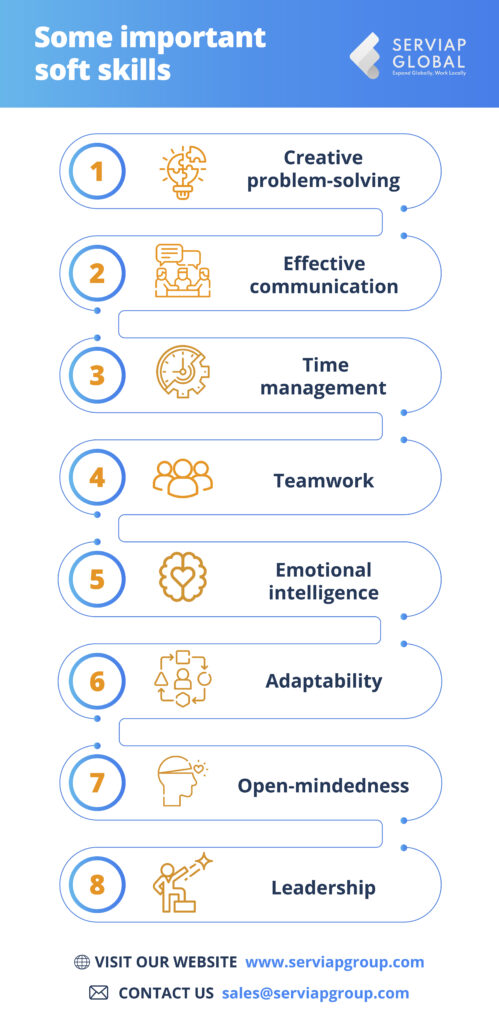Table of Contents
Years ago, when companies were looking to fill a vacancy, they focused on the ideal candidate having the knowledge, training, and experience required for the position. This is still necessary, but recruiters today also look for their prospects to have certain personality traits and attributes, or soft skills, that will help them better relate to and succeed in the workplace.
So, when a company starts a recruitment and hiring process, it should seek professionals who are not only experts in what they do but also have a combination of social and communication skills, service attitudes, and emotional intelligence.
SEE ALSO: Call center outsourcing: 5 great destinations to consider
And while some people might believe that with the advancement of technology and artificial intelligence, organizations want to replace their human capital with robots and automation software, the reality is that, as Forbes notes, the pandemic forced companies “to look at the human being and the place he or she occupies in the business value chain.”
At Serviap Global, we have been helping our clients recruit personnel worldwide for more than a decade. Soft skills, or power skills, are the most important in the “humanization” of companies, and below some of the top eight soft skills we have identified.
What are soft skills?
Soft skills are the attributes and personality traits that help people relate better in different contexts. According to Investopedia, soft skills are a person’s “character traits and interpersonal skills” that decide how well one interacts with others.
Soft skills are often innate personal attributes that can be used in a variety of situations and fields, but they can be developed. While they are more challenging to pick up later in life, soft skills are not impossible to learn and can be improved with experience and practice.
Why are soft skills important?
Employees need interpersonal, communication, and listening skills, time management, problem-solving, leadership, and empathy to relate better with others in the workplace. According to The Balance, these characteristics are what employers pay the most attention to when hiring new talent.
Managers increasingly want their workforce to have soft skills because they help them to be more successful in the company, in addition to being more adaptable and flexible individuals.
Employers must recruit workers with either well-developed soft skills or with the right traits that will allow them to build strong soft skills. However, hard skills remain critically important, so it’s necessary to have both in your skillset.
Differences between soft and hard skills
Contrary to soft skills, hard skills are the specialized and technical skills needed for particular fields. These skills are acquired and improved through education and experience. When hiring a new employee, the recruiter looks for specific knowledge or experience in an area.
Unlike soft skills, employees’ hard skills are specific to their profession and can be more easily quantified. Candidates are typically asked for a relevant and professionally accredited certificate, degree, or document that validates such knowledge.
SEE ALSO: Hire great international independent contractors
In practice, hard skills open doors to job opportunities, but soft skills help employees stay in the workplace and succeed. A good employee will be one with a balanced skillset, where ideally their soft skills augment and support their hard skills.
While soft skills are somewhat harder to verify during an interview process, recruiters are increasingly developing lines of questioning and tasks to test them.
Soft skills to look out for when recruiting
While the hard skills needed or desired will differ depending on position and profession, soft skills tend to be more generally applicable. Below some important soft skills to look out for when recruiting are highlighted.
1) Creative problem-solving
Regardless of the context or situation, challenges are a constant and soft skills can provide solutions. For that reason, when hiring a new employee, it is necessary to know if this person has the creative ability to solve a problem.
The employee may not have an immediate solution, but if they are capable of thinking outside the box and not simply on traditional technical lines, they can overcome day-to-day obstacles and solve everything from simple tasks to more complex challenges.
Creative problem-solving also leads to innovation —the use of a new idea or method— and process improvement within organizations. This illustrates the importance of soft skills to the long-term success of a business.
2) Effective communication
Effective communication involves transmitting clear and accurate information, the objectivity of the discourse, precise language —verbal, physical, or even writing— and understanding this information without altering its objective or intention.
Active listening is part of this soft skill since it is not enough to know how to express an idea. It is also necessary to comprehend how to listen when discussing, planning a project, or approaching a client. Even writing an email in an orderly and timely manner is effective communication.
This is an example of how soft skills work in tandem with hard skills in order to maximize productivity. It’s no good having a technical grasp of what is necessary in a task if you can’t also effectively pass on that message to the other members of your team.
3) Time management
Time management is, at heart, about working in the most efficient way possible. It’s one of the key soft skills for younger workers, especially those from Generation Z. Employees who can manage their time will be able to apply their hard skills in a more efficient manner.
These employees are organized, know how to prioritize essential tasks, plan their activities, set goals, and have good stress management. This in turn means that they get more done and produce more work.
Proper time management in the workplace is one of the key soft skills for an employee’s work-life balance, as they will be able to do other activities during their day and not just work. Therefore, they tend to be happier employees with less chance of burnout.
4) Teamwork
Much of this list is good for individual workers but what are soft skills that affect groups? Teamwork must surely go at the head of that particular list. Basically put, it’s the ability of an employee to work effectively with other people.

Each employee is a fundamental part of the company, but companies get better results when their personnel collaborate. This is one of the most effective soft skills for larger organizations. It requires workers to put their ego to one side and work well with others.
When hiring a new employee, they must have developed the ability to follow directions, manage and resolve conflicts that may arise from collaborative work, know how to exchange ideas, and have no problem coordinating with others.
5) Emotional intelligence
Today, to create healthier work cultures, it is essential that employees can perceive, evaluate and respond to their own and others’ emotions. Soft skills are all about this kind of internal understanding.
When emotions are well managed, it is easier to understand others, be empathetic and have compassion for co-workers and others with whom we interact. This helps prevent overworking, high stress and eventually burnout.
Furthermore, according to an article by the International Journal of Engineering and Applied Sciences (IJEAS), “success requires more than IQ (Intelligence Quotient), which has tended to be the traditional measure of intelligence.” This oversimplification towards academic qualities has meant businesses have ignored employees with solid soft skills.
6) Adaptability
In the modern workplace, change is a constant possibility. Sometimes this is because the current market is challenging and requires companies to update all the time, the development of new ways of working, or because there is increased employee mobility.
Therefore, when looking for new talent, employers should value that workers know how to adapt to changes, such as new methods, technologies, and ways of thinking implemented for the benefit of organizations.
When employees adapt quickly, they are ready to perform other tasks, face new challenges and even profile other jobs. What are soft skills for, if not to help employees develop and take on new roles?
7) Open-mindedness
To create harmonious work environments, it is necessary to understand that not everyone shares the same ideas, beliefs, and ways of seeing the world. Diversity is crucially important in modern workplaces and soft skills that allow an open mind are key for enabling this.
Someone is open-minded when they are tolerant or have no prejudices. This allows them to consider new possibilities and opportunities. With an open mind, employees won’t discard ideas that don’t conform to their existing world view.
In addition, being open-minded helps employees learn about themselves by challenging their beliefs, allows them to experiment, endows them with a more optimistic attitude toward life, and, most of all, makes them learn. They will also work better with all kinds of team-mates.
8) Leadership
Leadership is the ability of an individual or group to guide other members of an organization. To influence others, one must be creative when solving a problem, communicate, manage time optimally, work in a team, have emotional intelligence, adapt, and be open-minded. Thus, leadership is the sum of all soft skills.
Leadership is often innate and is one of the harder soft skills to learn. However, it is still possible to do so, especially if, as noted, the worker has a range of other soft skills to start with.
Although vacancies will not always be for managerial or middle management positions, there is a need for workers with a spirit of leadership who not only carry out an activity but also know how to handle conflicts and resolve them, make decisions, manage projects and personnel, and are willing to help others.
Importance of soft skills will continue to grow
Soft skills are essential for life, not only to interact better with co-workers and achieve success within an organization.
Talent searching is a complex task, as we can see. It is not enough to find people with knowledge, experience, and multiple training; employees must also have soft skills.
Companies are increasingly tuning into the need for soft skills among their professionals, and this trend is only likely to increase.
When hiring employees, perhaps not everyone has these eight power skills developed in the same way, but it is also worth remembering that soft skills, while sometimes innate, are also the product of coaching and practice, so that newly acquired talent can develop them in their workplaces.
Hire talent with excellent soft skills via Serviap Global
At Serviap Global, we understand that recruiting personnel with strong soft skills can be crucial to a successful international expansion, so we specialize in offering personalized and first-class service to our clients at all times.
As well as offering international PEO / EOR service, which involves us hiring overseas professionals on behalf of clients, we also provide standalone recruitment services through our global talent acquisition services, to support clients with finding direct hires around the world.
We are a family-run business that started in Mexico in 2010, before expanding throughout the world. While our vision is global, we are committed to the sort of service excellence and individualised treatment that comes with working with a local provider.
Contact us today to find out more about how we can assist you with global hiring.
If you liked this article about soft skills, check out more of our coverage here. Or read about us.
How useful was this post?
Click on a star to rate it!
Average rating 0 / 5. Vote count: 0
No votes so far! Be the first to rate this post.
We are sorry that this post was not useful for you!
Let us improve this post!
Tell us how we can improve this post?






